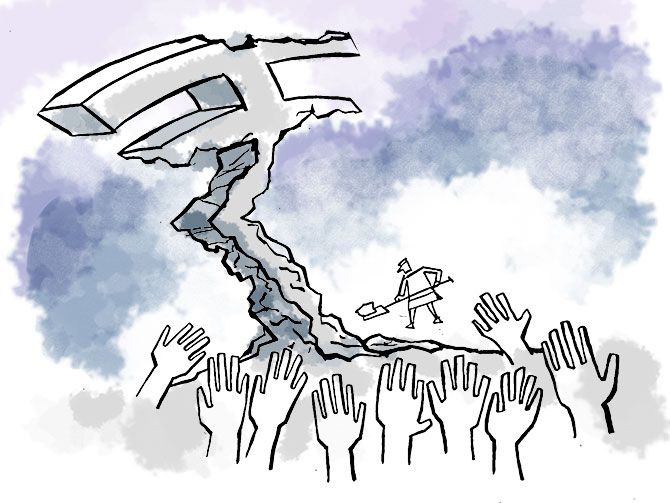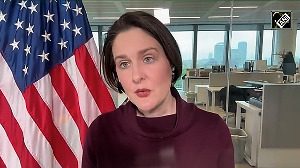Do the words 'fiscal deficit', whenever they come up for discussion anywhere -- be it the office lunch, family dinner, friends' get-together -- drive you into paroxysms?
Afraid that you don't have a hang of what exactly these two words mean?
Fret not, S Muralidharan, former managing director, BNP Paribas, breaks it down for you so you can hold your own the next time.

What the fisc is going on, seems to be the question on many a lip these days.
That every Indian has an opinion on any given subject without the least awareness of it, does not help. So it is with fiscal deficits.
Experts and academics seem to approach the issue with ever more arcane, esoteric and altogether obscure and incomprehensible jargon.
This situation calls for a middle ground between the incomprehensible mavens and the untrained social media warriors.
Today I intend to dispel the myths and simplify the jargon by explaining a technical term that everyone should understand but no one seems to be clear about; one that confounds us all.
If I oversimplify, it is in the interest of simplicity and clarity and may the mavens forgive me for this transgression.
The dictionary defines fiscal as 'of or relating to financial matters in general' and more narrowly as 'of or relating to the public treasury or revenue'.
The former is too broad and leaves us in the dark as to which aspects of public finance it might deal with.
Fortunately the latter definition nails it down perfectly with very little wiggle room for quibbling or prevarication. Someone having already done the hard work for us, it is the latter path we shall take today.
Why is it relevant?
Why should we concern ourselves with fiscal deficit, is a very good question at all times, more so now.
It deals with the government's finances and is an indicator of its ability to find the money required to pay for various public services like education, health, roads, defence etc and to tackle pandemics and pestilences when they occur.
We all contribute to the government finances by paying taxes directly (income taxes) or indirectly (GST) and therefore should be aware what use that money is put to.
Fiscal profligacy in public finance should come with a health warning, as do alcohol and tobacco, but does not. Its effects can be far worse if at times slower to show up.
It is as bad as personal profligacy and as in the case of the latter, leads the society to slow but certain and utter ruin.
But we choose not to concern ourselves, and leave it to the political operators whose focus is on the next elections and what they can expropriate in the meantime.
Just as families that spend beyond their means are on the downward spiral to debt, bankruptcy, and ruination, countries that spend more than they can afford also face a similar fate.
Except that countries can put off their tryst with their deficit-laden destinies by borrowing, by printing currency notes, by taxing more and so on.
Kicking the can down the road has the effect of making the problem more intractable eventually and the solutions more draconian when finally the government decides to face it and take a stand.
We should all therefore care about fiscal deficits that our governments are running and ask why.
As citizens we may not have the answers, but our questions can keep the governments on the straight and narrow.
The price of democracy, after all, is eternal vigilance.
Fiscal deficits ultimately lead to higher inflation, higher borrowing costs to businesses, farmers and consumers, and severely reduce the ability of the government to spend on essentials such as health, education, infrastructure etc.
The borrowings that governments resort to in order to bridge the deficit can shut out private sector borrowers, further weakening investments.
All of these lead to a spiral of declines in investments, economic activity and job creation.
What constitutes fiscal?
There are many facets to a government's finances. How it is collected (taxes, revenue), how the revenue is shared in our system of central and state governments, how it is spent (expenditure), how is the gap bridged (borrowing/printing money), the effect of deficit or surplus, how the cash (liquidity) in the economy is managed, how much of inflation is desired/targeted/permitted, and at what cost the government and consequently private entities can borrow.
Fiscal policy generally confines itself to revenue (or lack thereof), expenditure (or excess thereof) and the management of the resulting deficit (or, occasionally, surplus).
Interest rates are considered to be part of monetary policy which deals with broader issues in the economy. They are inter-related, but this framework helps us tackle the issues of managing an economy which, if taken as a whole, can be daunting and difficult to tackle.
Our focus today is the inability of the government's receipts to meet its spending, called fiscal deficit. It is also known among the market cognoscenti as The Fisc.
What is Fiscal Deficit?
Simply put it is the insufficiency of income to meet all the expenses. This can arise owing to a number of causes: Weak revenues and poor collection thereof, heavy spending, weak controls on spending and outright governmental irresponsibility and poor accountability.
Main cause of weak revenues is poor economic activity such as at the present moment.
Deficits can also arise due to uncontrolled expenditures. Populists are wont to spend indiscriminately in order to retain their popularity at the hustings.
Over time this leads to ballooning expenses and deficits with some notable harmful consequences which we shall see later.
Why do deficits arise?
As in personal life deficits arise because we spend more than we earn: When our yearning exceeds our earning.
Lower revenues can be the result of some or all of the following:
1. Poor economic activity;
2. Poor taxation policies that incentivise and enable tax-dodging;
3. Anti-tax ideology;
4. Poor enforcement of tax collection etc etc.
Poor control of expenditures is another reason for deficit. Most governments are guilty of vote-buying through populist subsidies and grandiose but meaningless spends on self-aggrandisement.
While spends on infrastructure, health, education are all essential for the welfare and progress of the nation, vanity spends on military and armaments for wars which we may never fight, and littering the countryside with statues of long-forgotten heroes are expenditures which beg critical examination.
Bloated government bureaucracy consumes humongous amounts of cash by way of salaries and inevitably breeds corruption by coming between the governed and the government.
Lower economic activity
Our main source of revenue is robust economic activity. If the economy grows robustly, revenues also grow.
If economic growth slows, so will revenues
The indicator of this aspect is a number called tax-GDP ratio.
It is the total tax collection divided by the size of the economy represented by GDP.
At 17% India's tax-GDP ratio is below the emerging market average of 21% and lags behind peers like Brazil, China and Russia.
The 'quality' of our tax income is also suspect, with its heavy dependence on indirect taxes (63%).
Personal taxes are only 13% and corporates pay a measly 19%.
Given the difficulties implementing indirect taxes such as GST, the over-reliance on them does not augur well for the fiscal deficit.
When economic activity shrinks and spending dramatically slides, such as now, tax collections will suffer even more.
If the economy shrinks, as seems certain this year, so will revenue.
This is actually a double whammy: Not only will our revenue shrink this year, we will also incur huge unplanned expenditures in order to kickstart the economy.
Huge public spending is also required in order to protect the most vulnerable sections of the populace from starvation and worse.
In combination with a steep fall in revenue, this spike in expenditure will push the deficit sharply up.
Already the deficit is estimated to be 7.5% (IMF estimate, includes central + state deficits) which will only worsen as the effects of the Covid shutdown are counted.
Don't miss Part 2! Should we raise taxes to cut the fiscal deficit?











 © 2025
© 2025